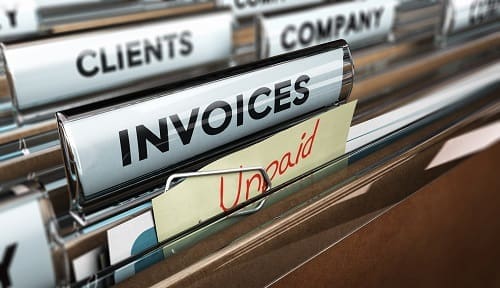
Getting ready to compare factoring companies? As with any financial product, it’s essential to become familiar with factoring and how terms differ from one provider to the next. Below, we’ll break down some of the most-asked questions people have when comparing factoring companies, areas to explore with each factoring company, and traits to look for as you make a decision.
Getting Started
Factoring can give your business an immediate cash injection by tapping into your unpaid B2B invoices. Often thought of as a type of accounts receivable financing, invoice factoring differs in that you’re not taking out a business loan, but rather, are essentially selling your unpaid invoices to the factoring company at a discount. After the factoring company pays you, they assume responsibility for collecting payment from your customer. That in mind, you can think of it as a no-debt cash flow solution intended to help with your organization’s short-term needs.
Do banks do factoring?
Banks offer accounts receivable financing, but they don’t generally offer invoice factoring services. Instead, they usually provide loans that leverage the invoices as collateral. You’re still responsible for chasing your invoices and you’ll pay the bank back over time with installments that include interest.
Can you have more than one factoring company?
You can only work with one factoring company at a time. The reason is fairly obvious—if multiple companies wind up giving you funds for the same invoice, untangling who gets paid would be a mess. This aspect is governed by the Uniform Commercial Code (UCC) which stipulates that a factoring company must file a UCC-1 financing statement when you enter into an agreement with them. The form essentially says that, as a financial institution, your factoring company has an interest in your “property,” which, in this case, is your invoices. It prevents other financial institutions from claiming rights to them. If you decide to switch factoring companies somewhere down the road, you can, but the new company needs to coordinate with you and your old company and file a new UCC-1.
Compare Each Factoring Company as a Business
Before breaking down the packages you’re being offered, evaluate each factoring company on the whole. Make note of details that distinguish the company, itself, from competitors, and whether they lead the pack with customer-friendly practices.
1. How long has the factoring company been in business?
Companies that stand the test of time usually have good track records for success and provide better factoring services. This is essential for you and for your customers, as the factoring company will become the face of your business in terms of collections. Reputable factoring companies have a long-standing history and proven track records, ensuring reliable service for your business.
2. Does the factor have clients in your industry?
Industry-specific expertise can ensure you’re getting a financial product that’s tailor-made for your niche and that the company understands your unique concerns. Oftentimes, invoice factoring companies specialize in a few key areas and build comprehensive solutions to serve that niche.
Industries like oil and gas have unique financial needs due to long payment cycles and substantial operational costs. Choosing a factoring company that offers oilfield factoring can provide specialized services tailored to these challenges. Such companies understand the intricacies of the oil and gas sector and offer solutions that improve cash flow, allowing your business to thrive even amidst industry-specific hurdles.
For example, one area Charter Capital specializes in is trucking and freight factoring. It means our representatives understand what carriers and freight brokers need, common payment terms in the industry, and provide other helpful services, such as fuel cards. There are unique features and benefits for each industry we support.
3. Can they handle your sales volume?
Factoring companies come in all sizes. Some may not have the ability to support your needs and you don’t want to find that out when you’re struggling with a cash flow issue and counting on your factoring company to come through. It’s also worth noting that you’ll generally pay less the more you factor, so selecting a company that can handle your sales volume can help ensure your costs stay low too.
4. Does the factor require minimum factoring fees?
Some companies tie you in with monthly minimums. For example, they may stipulate that you pay a certain amount each month regardless of whether you factor, or they may require you provide them with a certain volume each month. Small-business owners may look at these terms and think they’re doable, only to find their cash flow issues are reduced down the line and wind up paying for services they don’t really need.
5. Does the factor require a long-term commitment?
Don’t sign onto long-term contracts unless you really need to. As mentioned above, you may not need to factor for an extended period of time. Lots of businesses factor just to get through a seasonal lull, to get through an economic crunch, or to deal with an unexpected issue. Work with a company that lets you factor only the invoices you need to factor when you need to factor them.
6. Are the factor’s advance and fee structure competitive?
Get a general idea of advance rates and fee structures to ensure the company is competitive as a whole. For example, you’ll typically see advance rates ranging from 70 to 90 percent the invoice value and fees between one and five percent of the invoice value.
Pick the Best Factoring Company by Comparing Key Features
Once you evaluate factoring companies, you’ll want to take a look into the specifics of the package or product each of your leading choices offers. The best factoring company for your needs is likely to stand out.
Recourse vs non-recourse
Find out who is responsible if a customer doesn’t pay their invoice. Your factoring company will examine your customer’s creditworthiness, and thus likelihood of paying, prior to agreeing to factor an invoice, so non-payment is rare. However, in the event someone does skip a bill or go bankrupt, you’re ultimately responsible for their debt with recourse factoring. With non-recourse factoring, the factoring company assumes responsibility for the debt, though it’s usually in exchange for higher fees and/ or reduced advance rates.
Flexibility
Watch out for minimums and long-term contracts. Factoring is generally thought of as a short-term solution. Although large well-established companies may use it from time to time to avoid taking on debt while sorting out a cash flow issue, it’s more often leveraged by small and midsize businesses that eventually solve their cash flow issues or move onto bank-supplied solutions like lines of credit and term loans. If you’re tied into a minimum or a long-term contract, you could be forced to keep paying even when the model no longer suits your needs.
Factoring fees
Get an estimate to determine your actual rates so you can do a proper comparison. A lot of companies say they offer factoring fees of two percent or less, but your actual factoring fees will depend on a number of things, such as volume and the creditworthiness of your clients. You may not qualify for two percent even if its advertised. The same is true of advance rates.
Funding time
Find out how quickly you’ll get your cash and if there are additional fees for expedited service. Whereas some factoring companies offer same-day funding, others can take several days to a week or more.
Perks and value-added services
Explore what other benefits you qualify for by partnering with a company. As mentioned earlier, fuel advances are one way Charter Capital helps our trucking and freight clients. We also provide perks like free credit checks on your customers, 24/7 account access, and a dedicated account manager for clients in every industry, as well as other industry-specific perks.
Get a Free Rate Quote
As a leading recourse factoring company, Charter Capital provides competitive rates, flexible funding, same-day payment, and a wealth of perks, all with no long-term contracts. Explore how Charter Capital can help your business with a free rate quote.


